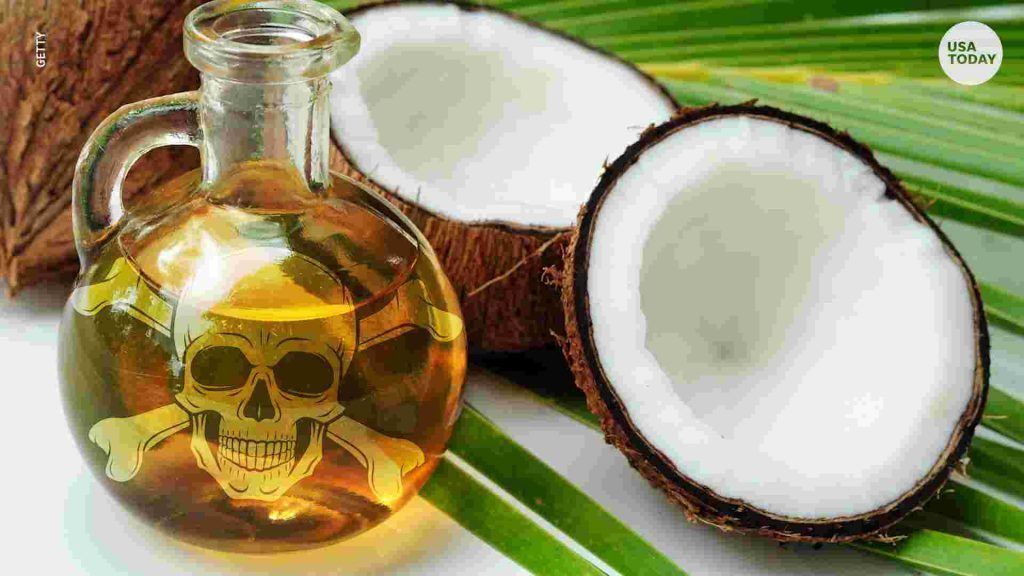
Coconut oil surged in popularity is due to beliefs that it supported the immune system and helped people to lose weight. Just like many other foods whose popularity climbs for a while, it appears to be falling out of grace. Sales were reported to have fallen in 2017.
Baby skin care: Solutions for baby dry skin rash
What the experts say
Dr. Karin Michels has been particularly harsh in her criticism. She is an adjunct professor at the Harvard T.H. Chan School of Public Health and spoke out about the dangers of coconut oil in a talk entitled “Coconut Oil and Other Nutritional Errors.”
Since her speech was posted on YouTube in July, it has been viewed over 960,000 times. Dr. Michels believes it is one of the very worst foods you can eat, calling it “pure poison” because its saturated fatty acids can raise LDL (bad) cholesterol levels and clog the arteries.
She is not the only expert with this view. Many others believe there is little data to support the hype about coconut oil or to confirm the benefits of consuming it. Dr. Alice Lichtenstein, a Tufts professor, and Dr. Frank Sachs, a nutrition professor, support this view.
Registered dieticians, physicians, and scientists at the Pritikin Longevity Center in Miami agree with them, saying that facts have been turned into fiction when coconut oil is touted as a ‘good’ saturated fat.
Last year, the American Heart Association issued an advisory that recommended against the use of coconut oil.
Baby eczema: Baby Eczema Natural Remedies
What the general population believes
Contrary to these experts, 72% of Americans were found in a 2016 study to believe in the health benefits of coconut oil. In spite of all the warnings, coconut oil continues to be used liberally in baked goods, stir-fries, sautés and roasted vegetable dishes.
People have yet to be convinced, and there’s still a great disconnect between lay and expert opinion. This disconnect seems to have been created by the way coconut oil has been promoted by marketers and endorsed by wellness bloggers, celebrities and health food stores for its nutritional powers.
Some basic facts
Every oil is a mixture of polyunsaturated, monounsaturated and saturated fatty acids. The most damaging fat is considered to be saturated fat. Coconut oil consists of way more saturated fat than unsaturated fat.
Where this becomes confusing is that there are different types of saturated fats. The saturated fat in coconut oil is made up of seven different types of fatty acids. These are stearic, palmitic, myristic, lauric, capric, caproic and caprylic acid.
Some of these fatty acids are medium-chain with less than 12 carbon atoms, and others are long-chain which 12 or more carbon atoms. The different types of saturated fat have a varying impact of the LDL cholesterol in the blood.
For example, one long-chain fatty acid called stearic acid does not have much impact on LDL cholesterol. Stearic acid is found in chocolate, and this is why butter and chocolate contain about the same amount of saturated fat, but butter raises LDL cholesterol levels more.
Lauric acid is the most predominant fatty acid in coconut oil. It has been found to increase HDL cholesterol, but there is also evidence that it raises LDL cholesterol levels as well.
Coconut oil contains more saturated fatty acids ounce for ounce than lard, butter or beef tallow. This means it has the potential to raise LDL cholesterol levels more than animal fats.
To not be confused: according to The American Academy of Pediatrics (AAP) for newborn safety, TOPICAL COCONUT OIL APPLICATION REDUCES TRANSEPIDERMAL WATER LOSS IN PRETERM
What about your heart?
It’s believed that lowering LDL cholesterol is essential for the health of your heart. Federal guidelines state that your LDL cholesterol needs to be less than 100mg/dL. Eating lots of coconut oil could make it difficult to get your LDL cholesterol levels within a healthy range.
Those in the coconut oil industry like to give the example of the Polynesian people who have relatively low risks of suffering from heart disease although their diets are high in coconut oil.
This is true, but it doesn’t take into account the many other factors in their lives that promote good heart health, such as a diet full of fiber, low in sodium and rich in omega-3 fatty acids.
What about Virgin Coconut Oil?
Marketers claim that virgin coconut oil is best because it is not hydrogenated. Hydrogenation is a process where unsaturated fatty acids take on the physical properties of saturated fats. Only a small percentage (8%) of coconut oil consists of unsaturated fatty acids in the first place.
This means that even if coconut oil is virgin, it has almost the same impact on cholesterol as hydrogenated coconut oil. You pay more for virgin coconut oil although it’s hardly better than the hydrogenated coconut oil.
Dr. Tom Brenna, professor of human nutrition at Cornell, believes that virgin coconut oil may not have as harmful an effect as an oil which is bleached, deodorized and refined. He says that when the oil is subjected to intense heat and treated with solvents, it raises LDL cholesterol levels to such an extent that scientists use it as a control when experimenting with different fats.
The harsh process destroys good fatty acids which can contribute to raising HDL (good) cholesterol levels. He says that if you’re going to cook with coconut oil, use virgin coconut oil and use it in moderation.
Those in favor of coconut oil point out its rich phytochemical content with helpful antioxidant properties. Virgin coconut oil does contain more phytochemicals than refined coconut oil but Dr. Qi Sun, associate professor of medicine at Harvard Medical School, says that even if you’re using extra-virgin oil, the effects of the saturated fat outweigh any beneficial effects of the antioxidants.
The Bottom Line
An intense online battle is raging between those who say that people have been duped by clever marketing as to the health benefits of coconut oil and those who say the science of coconut oil is more complex than food scientists acknowledge.
What’s interesting is that most public health bodies in the world are of the opinion that there is no strong scientific evidence to support the health benefits of eating coconut oil.








